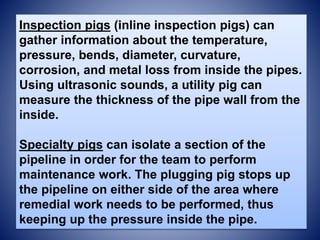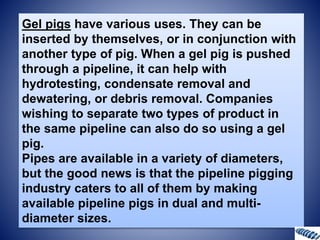Pipeline pigs
- 1. Drinkwater Products was established in Louisiana in 1987, delivering best-in-class pipeline specialty products for the oil and gas industry. With an unmatched selection of pipeline pigging products and unequalled customer service, Drinkwater Products has become the market leader for successful pipeline maintenance. Pipeline Pigging
- 2. Pipeline Pigging: An Innovative Concept in Pipe Cleaning Product manufacturers and distributors often use pipelines in processes, and pipeline pigging can ensure that the lines run smoothly. Slow transmission, cracks, flaws and plugging can have disastrous consequences in a manufacturing plant. Similarly, plants that produce more than one liquid product using the same infrastructure, can suffer contamination unless the pipes are thoroughly cleaned on the inside before a new product is inserted
- 3. Pipeline pigs are maintenance tools that are introduced into pipelines by means of a 'pig trap', which consists of a launcher and receiver. The pig can be used without causing any flow disruptions, and it can be forced through either product flow, or by being towed by a cable or other device.
- 4. Why Call it Pipeline Pigging? After all, a pipeline pig is not an animal...The one hypothesis is that 'pig' is short for Pipeline Intervention Gadget and another - more far-fetched - theory is that a leather pig was sent through a pipeline when the method was started, and it made a squeaking sound as it scraped along the walls of the pipes, much like an actual farm pig What is Pipeline Pigging? The pipeline pig is usually a spherical or cylindrical device that sweeps the inner walls of the pipes, scraping the sides as it pushes debris through towards the exit point. Not only does it clean the pipes, but it can also be used to inspect the integrity of the pipe interiors. As technology continues to evolve, pipeline pigging has evolved to perform different functions.
- 5. Utility pigs (solid cast pigs, foam pigs and mandrel pigs) are used to clean pipeline, much like you would clean a plumbing line. Over time, construction debris can start accumulating inside the pipeline and that's why it is so important that lines are cleared before production commences. The utility pig will scrape away debris. While a sealing pig removes liquids from the pipe, it can also act as a separator between different products using the same pipeline.
- 6. Inspection pigs (inline inspection pigs) can gather information about the temperature, pressure, bends, diameter, curvature, corrosion, and metal loss from inside the pipes. Using ultrasonic sounds, a utility pig can measure the thickness of the pipe wall from the inside. Specialty pigs can isolate a section of the pipeline in order for the team to perform maintenance work. The plugging pig stops up the pipeline on either side of the area where remedial work needs to be performed, thus keeping up the pressure inside the pipe.
- 7. Gel pigs have various uses. They can be inserted by themselves, or in conjunction with another type of pig. When a gel pig is pushed through a pipeline, it can help with hydrotesting, condensate removal and dewatering, or debris removal. Companies wishing to separate two types of product in the same pipeline can also do so using a gel pig. Pipes are available in a variety of diameters, but the good news is that the pipeline pigging industry caters to all of them by making available pipeline pigs in dual and multi- diameter sizes.
- 8. Information & Locations 1.800.515.7078 sales@drinkwaterproducts.com MAILING ADDRESS PO BOX 180 Centerville, LA 70522 FAX 337.828.5999 WAREHOUSE ADDRESS 10789 Hwy 182 Franklin, LA 70538








